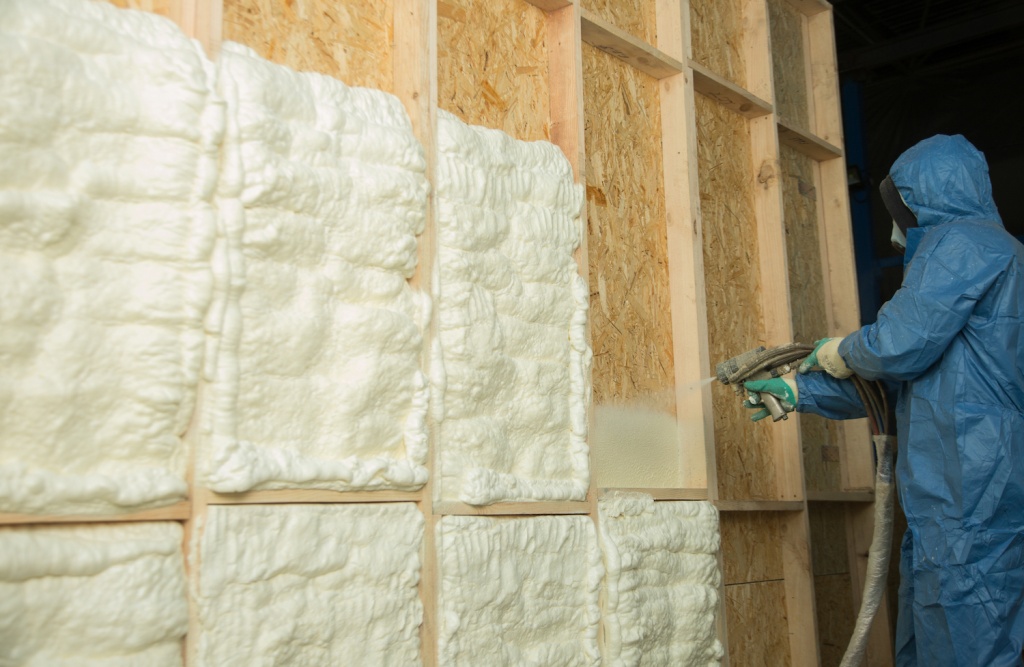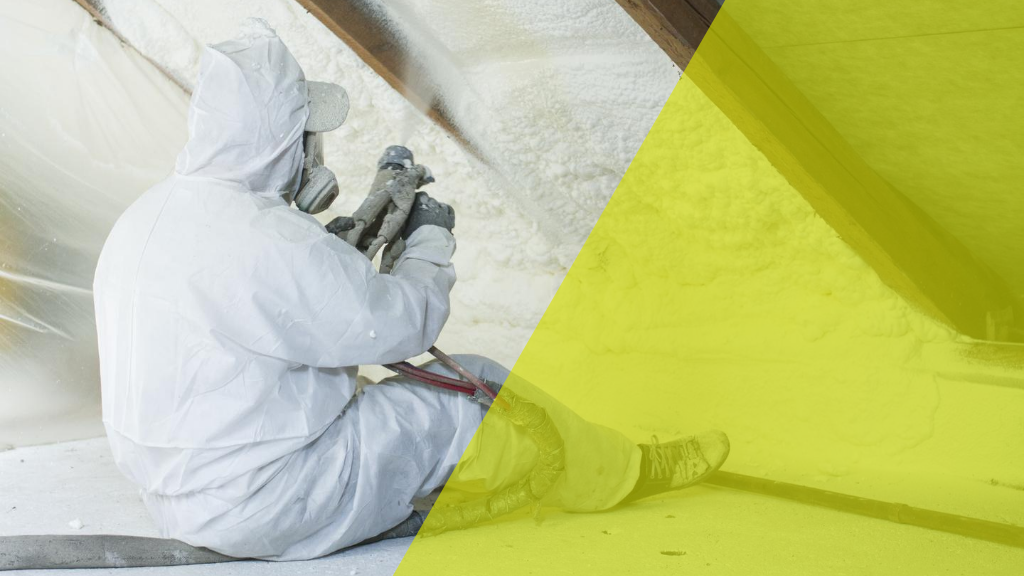Picking the Right Sort Of Spray Foam for Your Insulation Demands
Picking the Right Sort Of Spray Foam for Your Insulation Demands
Blog Article
Spray Foam: The Ultimate Option for Air Sealing and Insulation
Spray foam insulation has emerged as a leading solution for effective air securing and thermal insulation, supplying an one-of-a-kind mix of properties that establish it apart from typical approaches. Comprehending the full scope of its advantages, installment procedures, and comparisons with other insulation kinds is critical for making educated decisions.
What Is Spray Foam?
Spray foam is a versatile insulation product that incorporates the concepts of air sealing and thermal resistance to boost power effectiveness in buildings. Made up mostly of polyurethane or other similar substances, spray foam is applied as a fluid that broadens upon contact with surface areas, producing a solid, continual layer of insulation. This special building enables it to fill voids, fractures, and voids that typical insulation materials may ignore, offering a premium air seal.
There are two major sorts of spray foam: open-cell and closed-cell. Open-cell spray foam is lighter and a lot more flexible, supplying outstanding audio absorption and a lower R-value per inch - Spray Foam. On the other hand, closed-cell spray foam is denser, supplying a higher R-value, dampness resistance, and included architectural stability to building components
The application process typically involves specialized tools, ensuring a smooth application that complies with different substratums, including steel, wood, and concrete. This adaptability makes spray foam appropriate for both brand-new constructions and retrofitting existing frameworks. Its capability to create a closed obstacle significantly adds to lowering energy consumption and improving interior air top quality, thereby making it a favored selection amongst property owners and building contractors alike.
Benefits of Spray Foam Insulation
One of the most considerable benefits of spray foam insulation is its exceptional capacity to create a continuous air barrier, which efficiently lessens power loss. Unlike typical insulation products, spray foam broadens to fill up splits and voids, making certain that air leak is drastically lowered. This characteristic not only boosts power performance yet additionally brings about lower utility bills over time.
Additionally, spray foam insulation provides superior thermal resistance, adding to an extra secure interior setting. Its high R-value per inch enables reliable insulation in constrained rooms, making it excellent for attic rooms, wall surfaces, and crawl areas. The moisture-resistant buildings of spray foam assistance protect against mold and mildew development, advertising much healthier living conditions.
An additional essential advantage of spray foam insulation is its sound-dampening top qualities (Spray Foam). It successfully minimizes sound transmission in between rooms, developing a quieter and a lot more comfortable home setting. The toughness of spray foam also attracts attention, as it does not droop or work out over time, preserving its performance throughout its life expectancy
How Spray Foam Functions
Understanding just how spray foam insulation works is essential for appreciating its performance in air sealing and thermal resistance. Spray foam insulation includes two main parts: isocyanate and polyol resin. When these parts are mixed, they go through a chemical reaction that triggers the product to increase rapidly, producing a thick foam that fills up cracks, voids, and tooth cavities.
As the foam broadens, it complies with surface areas, developing a closed seal that considerably lowers air infiltration. This particular makes spray foam insulation very effective at avoiding drafts and dampness infiltration, which can result in power loss and damage over time. Furthermore, the closed-cell version of spray foam uses superior thermal resistance due to its rigid framework, successfully lessening warm transfer.
The distinct residential properties of spray foam permit it to comply with irregular surface areas, making sure extensive coverage and a seamless obstacle. As an outcome, spray foam insulation not only improves power efficiency but also adds to improved interior air quality by lowering the buildup of irritants and toxins. Ultimately, understanding the mechanics behind spray foam underscores its duty as a premium selection for insulation and air sealing in both domestic and commercial applications.
Setup Process Review

Prior to installation, the area needs to be appropriately cleaned up and prepped, making certain that surface areas are devoid of moisture, dust, and debris. Because pollutants can jeopardize attachment and total efficiency, this action is essential. When the area is prepared, the application includes blending the 2 elements of the spray foam, which increases upon call and loads gaps effectively.
Trained professionals ought to carry out the setup, using specific devices to Home Page make sure consistent insurance coverage and optimum thickness. Safety and security preventative measures, consisting of putting on safety equipment and making sure appropriate ventilation, are necessary throughout this procedure. After application, the foam normally remedies swiftly, developing a solid obstacle that enhances power performance.
Contrasting Spray Foam to Standard Insulation
When reviewing insulation choices, spray foam insulation stands out in comparison to typical materials such as fiberglass and cellulose. Unlike fiberglass and cellulose, which can permit air infiltration, spray foam expands upon application, filling up crevices and voids to produce an impermeable seal.
Furthermore, spray foam provides a greater R-value per inch than traditional insulation kinds, providing even more effective thermal resistance in a thinner account. This characteristic is specifically advantageous in rooms with restricted dental caries depth. Spray foam is resistant to dampness and mold see page and mildew growth, which can be a substantial worry with cellulose and fiberglass, particularly in damp settings.
However, spray foam insulation commonly carries a greater ahead of time cost than its standard equivalents. Property owners need to consider this initial financial investment versus long-term energy cost savings and efficiency advantages. Ultimately, while both insulation types serve their function, spray foam arises as an advanced service for contemporary insulation demands, particularly in terms of air sealing and thermal efficiency.

Verdict
In recap, spray foam insulation stands for a very reliable remedy for attaining optimum air securing and thermal resistance. Its special buildings, consisting of dampness resistance and audio dampening, make it appropriate for different applications in both new constructions and retrofitting projects (Spray Foam). The initial prices might be higher contrasted to standard insulation materials, the long-term advantages, such as considerable energy financial savings and enhanced indoor air top quality, validate the investment and emphasize its value in modern structure practices.
Spray foam insulation has actually emerged as a leading solution for reliable air sealing and thermal insulation, supplying a special combination of residential or commercial properties that establish it apart from conventional methods.Spray foam is a flexible insulation material that integrates the principles of air securing and thermal resistance to enhance energy efficiency in buildings.When her comment is here evaluating insulation choices, spray foam insulation stands out in contrast to conventional products such as fiberglass and cellulose. Ultimately, while both insulation kinds serve their function, spray foam arises as a much more innovative service for modern-day insulation needs, especially in terms of air securing and thermal effectiveness.
In recap, spray foam insulation represents an extremely reliable solution for accomplishing optimum air sealing and thermal resistance.
Report this page